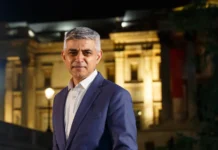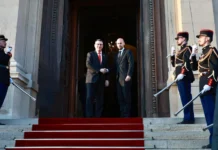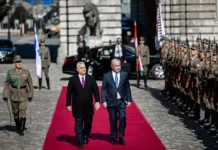Our Parasha starts with a statement “at the end of two years” (“וַיְהִי, מִקֵּץ שְׁנָתַיִם יָמִים”), alluding to specific two years. Yosef was punished with ten years of prison while he was 18, one year for each of his sins against his ten brothers and two more for trusting man (the baker) and not HaShem. Yosef’s punishment of staying in jail for extra two years was due to two words, “remember me” (“אִם-זְכַרְתַּנִי”) he asked an Egyptian. The prophet Yermiyahu (Jeremiah) wrote “cursed is the man that trusts man” (“כֹּה אָמַר יְהוָה, אָרוּר הַגֶּבֶר אֲשֶׁר יִבְטַח בָּאָדָם”). Yosef placed his trust in man and brought a curse upon himself. We should learn from this punishment that HaShem expects us to pray to Him directly and ask Him to ease our pain of “bondage” in our lives, as we bring “pain” upon us by our actions and not fulfilling our true purpose. Our Sages explain that it takes 12 years to “fix” our bad traits as Lashon Ha’arah, Yosef achieved this Tikun (fix) while serving 12 years in Egyptian jail.
We should never count on human beings to “ease” our pain as it is only in HaShem’s hands. Our Sages says that even when asking a “big” Rabbi for blessings, one should ask the Rabbi to ask HaShem for such blessings. A true Rabbi is a conduit linking HaShem with earth and providing blessings to us all, just as Yosef would while being the ruler of Egypt. We learn that from the verse (Jeremiah 17:7) “Blessed is the man that trusts in HaShem, and HaShem will protect him” (“בָּרוּךְ הַגֶּבֶר, אֲשֶׁר יִבְטַח בַּיהוָה; וְהָיָה יְהוָה, מִבְטַחוֹ”).
Within the words “Miketz Shenatyiem Yamim Cholem” (“מִקֵּץ שְׁנָתַיִם יָמִים; וּפַרְעֹה חֹלֵם”) which mean at the end of two full years Pharaoh had a dream, we learn about a prophecy. The acronym of these words spells the word “Meshicho” (“משיחו”), hinting that Yosef’s offspring will be “Meshicho”. At the end of the “dream” the Mashiach will come, as it is says (Tehilim 126:2) “When HaShem brought back those that returned to Zion, we were like in a dream” (“בשוב יהוה, את-שיבת ציון היינו, כחולמים”). The Zohar says that when the Torah writes “Yamim יָמִים” (days) while speaking of years, it represents 2000 years. Alluding to that in the end of these 2000 years the true redemption of Mashiach.
Important to mention here that we usually read this parasha at the same time of Chanukah, as we learn about the miracle of Chanukah from Pharaoh’s dreams. Chanukah was a miraculous military victory, a small group of righteous Sanhedrin members (Chashmonaiem) defeat the mighty Greek military. We learn this from the forth verse “וַתֹּאכַלְנָה הַפָּרוֹת, רָעוֹת הַמַּרְאֶה וְדַקֹּת הַבָּשָׂר, אֵת שֶׁבַע הַפָּרוֹת, יְפֹת הַמַּרְאֶה וְהַבְּרִיאֹת”, and the “skinny and lean-fleshed” (Jews) did eat up (defeat) the “fat cows” (Greeks). We notice that in every end of parasha (in the Chumash) we see the amount of verses, but in our parasha we see both the amount of verses and amount of words. The amount of words is 2025, came to hint about Chanukah, as we light eight “נר” “Ner” (candles) and celebrated on the 25th of Kislev. The word Ner in numerical value is 250, and since there are eight its equals to 2000, since we celebrate it on the 25, hence the total amount of 2025.
The word “Miketz” (“מִקֵּץ”) is an acronym of three things that can save someone’s life (Jews) when performing these Mitzvot:
- The letter “מִ” (“Mem”) is for “Mamon” (“ממון”), money.
- The letter “ק” (“Kuf”) is for “Kol” (“קול”), voice alluding to Tefilah (praying).
- The letter “צ” (“Tzadik”) is for “Tzom” (“צום”), fasting.
On the eve of Rosh Hashanah, HaShem decrees to all nations their destiny in all aspects of lives. The night before Pharaoh was dreaming while “standing” in the river and not on its banks as he believed that he is the god of the Nile. He used to tell the Egyptians that he is god and he created and ruled over the Nile. That was his downfall as the Nile turned into blood and his kingship was destroyed, as there is (and never will be) no other God but HaShem. In the next parasha we would learn about HaShem asking Moshe to go and “meet” Pharaoh at the Nile banks very early in the morning, surprising him when he was “going to the bathroom”; in other words telling Pharaoh that he is not a “god” and embarrassing him.
Awaken by two unexplainable, a bit scary and weird dreams, Pharaoh seeks help and clarification from his advisors. Reading the verse carefully we see that he was awaken by one dream only, as it says “Chalom” (“חלום” – one dream). The Torah writes that he woke up and noticed that it was a dream, referring to the second one, but not the first dream. The reason is that in one dream it seems natural for cows to have mouths and to use it for eating, unlike the second dream in which the plants had mouth, which was very odd. He first dream of seven well-grown good-looking cows coming up from the Nile River on to the riverbanks to graze, followed by another set of seven skinny cows coming up and ate the well-grown cows. In his second dream seven healthy and well-grown Sheaves “ears of grain” corn, are growing on one stalk, and seven thin “ears of grain”, corn are growing and eating the seven well-grown “ears of grain”. This Sheaves dream is a repetition of Yosef’s dream in the past with his brothers.
Unlike the first dream, Pharaoh woke up and said that it was a dream. The next morning Pharaoh was puzzled and worried about these dreams. He asked all his dream “solvers” and sorcerers to solve and explain his dreams and figure out their message. They all provide him with unsatisfying answers, as none of theme could understand what Yosef would. Still very worried Pharaoh was extremely restless, the Ben Fish Chai says that he was about to die. These dreams are the beginnings of the prophecy of exile, as HaShem promised Avraham. As a result of the famine, Yaakov, went down to Egypt and fulfilled this prophecy.
Pharaoh’s wine minster confessed and said to Pharaoh that he sinned twice, once with Pharaoh’s daughter and once with a “ נַעַר עִבְרִי – young man, a Hebrew”, named Yosef. The reason he uses the term “young man” to describe Yosef was to belittle Yosef in the eyes of Pharaoh, so that he would not lose his position as minster. He told Pharaoh all about Yosef and his incredible ability to “solve” dreams, as he pointed out the exact outcome as predicted by Yosef when he was in prison. He confesses “וַיְדַבֵּר שַׂר הַמַּשְׁקִים, אֶת-פַּרְעֹה לֵאמֹר: אֶת-חֲטָאַי, אֲנִי מַזְכִּיר הַיּוֹם”, “the chief butler says to Pharaoh: ‘I make confess of my sins this day”.
Pharaoh ordered his servants to free Yosef and to bring him to the palace. Yosef is “rushed” “cleaned up” and brought in front of Pharaoh. It is important to mention that the Torah referred to Pharaoh as “king of Egypt” only when he meets Yosef, alluding to Yosef’s greatness as he will be influencing the whole country and the world. All the other times that the Torah speaks of Pharaoh he is called only Pharaoh without the title king. Yosef’s extra two years in prison allowed him to become a viceroy to the king of Egypt, as he completed his punishment. Had he gotten out earlier than this exact time of Pharaoh’s dreams, he would be just known as a dream-interpreter and nothing else. The year is 2230 and Yosef is released from prison on Rosh Hashanah and becomes a viceroy that evening. Yosef is now thirty years young, Yaakov is one Hundred Twenty and Yitzchak is one hundred eighty years old. Yitzchak will be passing away this year.
Pharaoh told Yosef about his dreams, and how no one in his kingdom could interrupt and solve them. Yosef replied humbly that his ability to interpret the dreams comes from HaShem, as the Torah writes “אֱלֹהִים, יַעֲנֶה אֶת-שְׁלוֹם פַּרְעֹה”. This humble statement of Yosef is the “Teshuvah” (“תשובה” – repentance) he did for asking the wine minster to “remember him” rather than asking HaShem for help. Pharaoh started telling Yosef about his two dreams. However, Pharaoh wanted to see if Yosef was really guided by HaShem’s Divine interpretation, so he skipped one detail of the fat cows, in order to test him. Pharaoh also complimented Yosef, but Yosef was humbled as relaid on HaShem. Yosef understood the profound prophecy of each dreams and their conclusions, as they were two of the same solutions. He told Pharaoh that his description of the cows was incorrect, and Pharaoh understood Yosef’s Godly ability to solve the dreams. Yosef explained to Pharaoh his dreams and provided solutions, saying that there will be seven years of abundance followed by seven years of famine.
Although Yosef was not asked to provide solutions rather just interpretation, he went even farther than any of Pharaoh’s Egyptian advisors and advised him to get ready for the seven years of famine. Guided by HaShem, Yosef spoke with full knowledge of preserving such grains for seven years, and Pharaoh was extremely impressed and satisfied with Yosef’s guidance. Yosef provided Pharaoh with all the solutions needed to withstand the famine in Egypt and beyond. It is worth mentioning here that when Yaakov came to Egypt, the famine was already at its second year, Yaakov’s arrival and blessings postponed the famine for the next five years. The Nile waters overflowed and an abundance of fruit and vegetables were grown. Yaakov and his sons were given the land of Goshen as it belonged to Sarah (who received it from Pharaoh as a gift). According to Kabbalah Pharaoh’s dreams, which ultimately led to the exile of our Forefathers, contained within it the motif of contradiction, the symbol of exile, when the “years of plenty” and love for HaShem, stand side by side with the “years of famine”, and spiritual weakness. As we see today in our world there is extreme wealth side by side with extreme poverty.
Pharaoh’s advisors objected to Yosef’s appointment, and try to dissuade Pharaoh from doing so. They said that Yosef was a slave who was sold for only twenty silver coins. They tried every possible way to avoid the unavoidable outcome of having Yosef rule over them. Pharaoh told his advisors that Yosef came from a well-to-do family and that he was not a slave, as he was too “pretty” and smart to be one. Pharaoh also stated that Yosef spoke sixty-nine languages with a Godly stature, basically stating that he is a man of royalty (eventually Yosef would speak seventy languages). The advisors wanted a proof of Yosef’s spoken knowledge of these languages. The same night the Angel Gabriel came to Yosef and taught him all seventy languages, he added the letter “Hei” (“ה” – for HaShem) to his name “Yehosef” (“יהוסף”) so he could remember all seventy languages. Before Pharaoh’s advisors tested Yosef the next morning, Pharaoh tested him and Yosef knew seventy languages, one more language then the sixty-nine Pharaoh was aware of. The seventieth language Yosef knew was Hebrew, which Pharaoh did not understand. Pharaoh made Yosef take an oath to never tell anyone about it and most definitely not to Pharaoh’s advisors. In those times kingship was awarded to the one who could speak the highest number of languages, and Pharaoh was afraid to lose his kingship position.
We learn that HaShem (his Angel Gabriel) taught Yosef all the languages as we see in Tehilim chapter 81:6, as its written “עדות ביהוסף שמו, בצאתו על ארץ מצרים, שפת לא ידעתי אשמע”. Yosef admits that he never heard such languages. HaShem’s Angel “planted” it in Yosef for a testimony, when He went forth to rule the land of Egypt, the speech of one that I didn’t hear”. As we pray every Shabbat “עדות ביהוסף שמו” as a testimony to Yosef.
The Torah writes that Yaakov “saw” that Egypt was plentiful and he understood that HaShem’s hand is in it. Yaakov lost his ability to see the prophecy but he hoped that Yosef was still alive. Usually HaShem makes us forget a deceased person after a “short” period of time (usually one year), but since it has been twenty-two years and Yosef was still alive, Yaakov could never really forget him. Yaakov asked his sons, why are they staying in Canaan rather than going down to Egypt to get food as we see in 42:1 “לָמָּה תִּתְרָאוּ”, which also means “why are you afraid”. The brothers were trying to prolong the descent to Egypt because they “knew” that everything happened because of what they did to Yosef, who probably ended up in Egypt. They knew that they were going to be punished for what they did. Yaakov sent ten of his sons to Egypt to bring food, he did not send Binyamin. Yaakov instructed his sons to enter Egypt separately from ten different entry points. One reason was so that the Egyptians will not think that they were provoking war and surveying the land. Another reason is not to cast an evil-eye upon them if they were all together in a foreign land. They also wanted to survey the land of Egypt, so that in case of a provocation from the Egyptians they will be able to fight back throughout the land. The brothers were all strong military leaders, righteous and wise men; they hoped to find Yosef and bring him back while “surveying the land”. They thought that Yosef might be found in the marketplace or elsewhere in the land of Egypt, as he was sold to merchants.
Yaakov said to his sons to “go down there” (verse 42:2); the words “שמה רדו” “Redu Shama”. The words “go down there”, are a clear indication and a hint of the exile and its redemption prophecy. The numerical value of the word “Redu” (“רדו”) is 210, the number of years Bnei-Yisrael will be in exile in Egypt. The word “Shama” (“שמה”) alludes to the redemption, as it has the same letters as Moshe (“משה”), who will lead them out of Egypt. The Torah writes that the brothers went to Egypt as “Yosef’s Brothers”, to teach us that they started to repent prior to arriving in Egypt. Yosef was also in-charge of all entry points to Egypt; he kept a chart of all the world’s leaders who came to get food. When the brothers arrived in Egypt Yosef saw their names in the records.
The moment Yosef saw his brothers he accused them of being spies who came to survey the land for its weak points and to attack, as the Torah writes, “to see the nakedness of the land you came” “וַיֹּאמֶר אֲלֵהֶם מְרַגְּלִים אַתֶּם, לִרְאוֹת אֶת-עֶרְוַת הָאָרֶץ בָּאתֶם”. Yosef was telling his brothers that they came to look for him in the “brothels of Egypt”; he was hinting that since he was handsome and they “sold him”. Usually as handsome slave he would be sold as a male prostitute; we learn this from the words “Ervat HaAretz” (“עֶרְוַת הָאָרֶץ”), the nakedness of the land. With the word “Meraglim” (“מְרַגְּלִים” – spies), Yosef was also hinting to something else to his brothers.
The acronym of the word “Meraglim” (“מְרַגְּלִים”) has a secret message, Yosef was saying to his brothers:
“MeRachel Ganavetem LaYishmaelim Yosef MaChartem”
“מר-ג-ל-י-ם: מרחל גנבתם לישמעלים יוסף מכרתם”
Meaning you stole Yosef from Rachel and sold to the Yishmaelim.
By saying to his brothers “you are spies” (מְרַגְּלִים אַתֶּם), Yosef was also hinting about the prophecy of the spies (In Parashat Shelach) in the Torah, which will take place 212 years from this point. As we know the heads of tribe will sin with the “sin of the spies” and will all be punished with 40 years, death in the deserts and wont be allowed entrance to the land of Israel. These are the same souls of Yosef brothers who later on will be reincarnated into the 10 spies and pay for their sin of selling Yosef to slavery.
This whole event was designed to bring Binyamin back to Yosef, while the brothers went back to Yaakov in order to fulfill the second dream and prophecy, in which Yaakov and his wives bow down to him as his second dream. Upon the discovery of the goblet and by their own admission and decree, Binyamin was taken back as “slave”. The brothers tore their clothes as a sign of mourning, their Teshuvah became stronger. They proclaimed that they cannot return to their father empty-handed, without Binyamin. Yehuda took the lead and said that they are all innocent and this is HaShem’s way of punishing them all (ten brothers excluding Binyamin) for the sale of Yosef. Yosef said that Binyamin will be his slave; “Hu Yihye Li Eved”. The numerical value of the word slave (“עבד”) is 146. He sent the brothers back to Yaakov without Binyamin. The Hebrew word for world is Olam (“עולם”), and its numerical value is also 146. King David says (Tehilim 105:4), “Seek His Presence”. The word for presence, literally his face, is “Panav” (“פניו”). All three words: “Eved” (“עבד”), Olam (“עולם”), and “Panav” (“פניו”) have the same numerical value of 146. Yosef was hinting to his brothers that HaShem will show His “face” in the portion of Binyamin in Beit-HaMikdash in days of Mashiach.


























